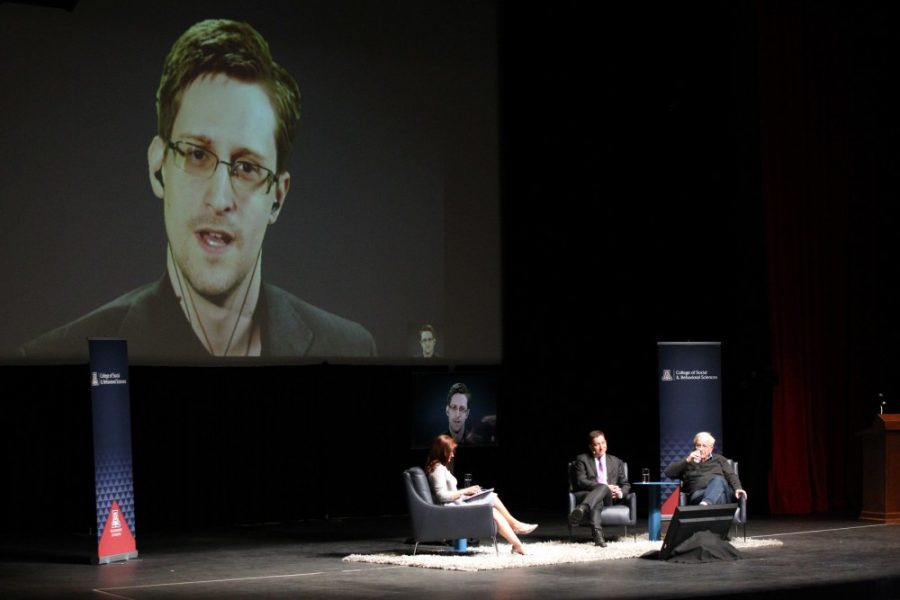Renowned linguistics professor Noam Chomsky recently visited the UA for two weeks to give lectures and participate in other events in and around campus.
Chomsky is not a newcomer to the university, however.
He has visited the UA three times over the past four years, according to Thomas Bever, regents’ professor of linguistics, psychology, cognitive science and neuroscience.
Aside from the panel discussion he contributed to with Glenn Greenwald and Edward Snowden on March 25, he also gave two lectures to linguistics students in a biolinguistics course and led a discussion with graduate linguistics students at the home of Simin Karimi, the head of the UA Department of Linguistics.
Faculty allowed students to have time alone with Chomsky during the lectures and discussions to ask him whatever questions they had, including those about the event held at Karimi’s house.
Karimi said this practice is done so students feel independent and comfortable asking questions.
“Students have reported to me that has been an extremely beneficial experience for them,” Karimi said. “They have said things like it’s a once in a lifetime experience for them to have a legend in linguistics fully to themselves so that they can talk, they can ask questions and discuss everything they want. It’s for the benefit of the students to be more comfortable in the absence of their professors.”
Karimi taught a course on biolinguistics with Bever and Massimo Piattelli-Palmarini, professor of cognitive science to prepare students for Chomsky’s visit. The class focused on the development of his theories, so the students were familiar with the “way he thinks and the way that his line of scholarship has developed,” Karimi said.
One of Chomsky’s lectures focused on the recently published book, “Why Only Us: Language and Evolution,” that he and Robert C. Berwick wrote, which the biolinguistics course is now reading and discussing, Piattelli-Palmarini said.
“[Chomsky has] been a leader of the field not just because of his ideas, but because he has given people with an interest in language structures that they then could try to apply,” Bever said.
Chomsky has been especially influential on the UA linguistics department faculty, where several of the faculty have either directly or indirectly been students under Chomksy at the Massachusetts Institute of Technology, Karimi said.
Bever earned his doctorate from the program Chomsky and his colleagues started.
“This linguistics faculty has been called informally for years the MIT of the West because so many of us were at MIT, and we really have been formed at MIT by Chomsky,” Piattelli-Palmarini said. The professor spent 10 years at MIT and co-authored a paper with Chomsky. “So it’s very congenial for him to find his former students now professors here.”
The faculty was able to discuss their work with Chomsky, and Piattelli-Palmarini even said that, while there are no formalized plans yet, there is a possibility that he and Chomsky will work together on research in the future.
Students were also able to talk with Chomsky one-on-one about their research, giving them the opportunity to receive feedback from the linguistics professor about their work, according to Karimi.
While there are no finalized plans for Chomsky to return to the UA to lecture next spring, Karimi and Piattelli-Palmarini both said that it is a possibility.
“Intellectually and academically, [his visit] had an enormous effect on students,” Karimi said. “I can’t even start telling you how important it was for students and faculty to have such a personality. Every class you go to in linguistics has something about his ideas and his work, so having the man himself here was enormously important.”
Follow Ava Garcia on Twitter








